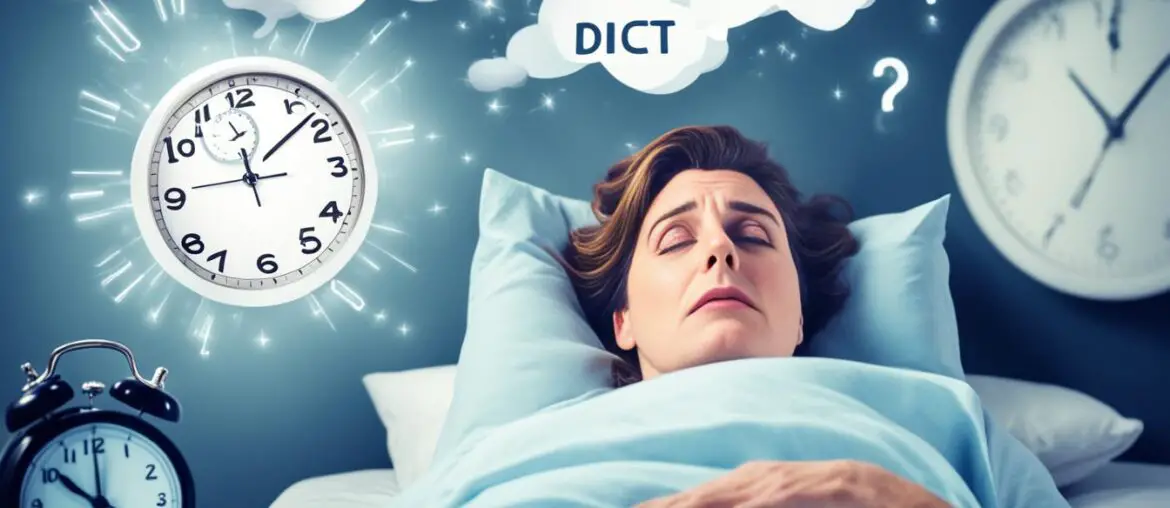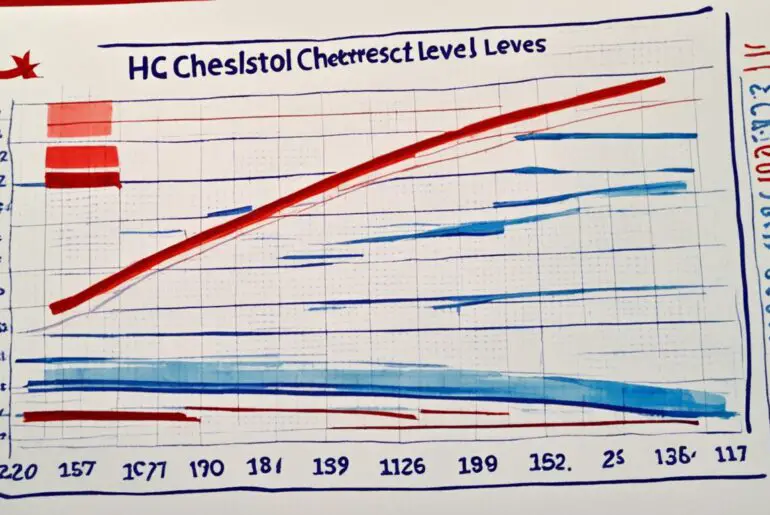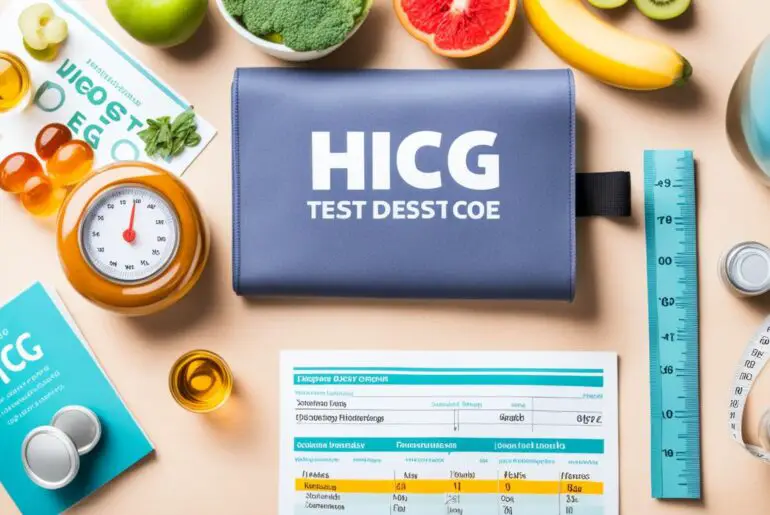Are you struggling to sleep while on the HCG diet? If so, you’re not alone. Insomnia is a common side effect of this weight loss program, but there are solutions to help you overcome it. In this article, I will guide you through effective strategies to improve your sleep and find relief from insomnia caused by the HCG diet.
When you’re on a weight loss journey, getting enough sleep is crucial for your overall well-being and success. Lack of sleep can hinder your weight loss progress and impact your health. That’s why it’s essential to find ways to address insomnia and prioritize the quality of your sleep while following the HCG diet.
Key Takeaways:
- Insomnia is a common side effect of the HCG diet.
- Sleep plays a vital role in weight loss and overall health.
- Lack of sleep can lead to cravings and make weight loss more challenging.
- Understanding the causes of insomnia can help in finding effective solutions.
- By implementing sleep hygiene practices and relaxation techniques, you can improve your sleep during the HCG diet.
Importance of Sleep on the HCG Diet
Adequate sleep is crucial for overall health and well-being, especially when following the HCG diet. Sleep plays a vital role in weight loss and can greatly impact the success of the diet. Research suggests that proper sleep during a weight loss program can result in a higher ratio of fat loss to muscle loss, ultimately leading to better overall results.
Sleep is essential for numerous reasons. First, it allows the body to repair and regenerate cells, which is crucial for muscle recovery and growth. Getting enough sleep helps preserve muscle mass while shedding excess fat, which is particularly beneficial for individuals following the HCG diet.
Secondly, sleep has a significant impact on metabolism. During sleep, the body goes through important metabolic processes that influence weight loss. Hormonal balance is key to maintaining a healthy metabolism, and sleep plays a role in regulating hormones that are involved in appetite control and fat storage.
Insufficient sleep can disrupt the balance of hormones like ghrelin and leptin, which are responsible for hunger and fullness cues. This disruption can lead to increased cravings for high-calorie foods, making weight loss more challenging. On the other hand, adequate sleep helps regulate these hormones, reducing cravings and promoting healthier food choices.
Furthermore, quality sleep supports overall mental and emotional well-being, helping individuals stay focused and motivated in their weight loss journey. Sleep deprivation is known to impair cognitive function and increase stress levels, which can negatively affect adherence to a diet and exercise routine.
To fully reap the benefits of sleep on the HCG diet, it is essential to prioritize sleep hygiene. This includes establishing a consistent sleep schedule, creating a comfortable sleep environment, and practicing relaxation techniques before bed. Avoiding caffeine and stimulating activities close to bedtime can also promote better sleep quality.
| Benefits of Sleep on the HCG Diet: |
|---|
| – Higher ratio of fat loss to muscle loss |
| – Improved hormone balance for appetite control |
| – Reduced cravings for high-calorie foods |
| – Enhanced cognitive function and focus |
| – Better emotional well-being and stress management |
Getting enough sleep is crucial for weight loss success on the HCG diet. Prioritizing sleep, along with a healthy diet and regular exercise, can optimize results and contribute to long-term weight management.
The Link Between Sleep and Weight Loss

A study conducted on two groups of people following the same diet but with different sleep durations found that the group with adequate sleep lost more fat and maintained their muscle mass compared to the group with limited sleep. The study also showed that inadequate sleep can lead to higher levels of ghrelin, a hormone that triggers hunger, and lower levels of leptin, a hormone that signals fullness. The hormonal changes caused by lack of sleep can increase cravings for calorie-dense foods and make weight loss more challenging.
Getting enough sleep is crucial for weight loss and can have a significant impact on metabolism. Sleep plays a vital role in regulating various hormones and physiological processes that influence appetite, food choices, and energy expenditure. When sleep is disrupted or inadequate, it disrupts the delicate balance of these hormones and can lead to imbalances that favor weight gain.
Adequate sleep duration and quality are essential for optimizing weight loss efforts. Prioritizing sleep hygiene practices, such as maintaining a regular sleep schedule, creating a relaxing bedtime routine, and creating a comfortable sleep environment, can help improve sleep duration and quality.
In addition to sleep duration, it is also important to consider the quality of sleep. Aiming for uninterrupted and restorative sleep can support weight loss and metabolic health. Strategies like practicing relaxation techniques, such as deep breathing exercises or guided imagery meditations, can help promote a calm and relaxed state conducive to better sleep.
“Getting enough sleep is crucial for weight loss and can have a significant impact on metabolism.”
Poor sleep can also lead to increased stress levels and elevated cortisol levels. High cortisol levels can promote fat storage, especially in the abdominal area, and contribute to weight gain. Managing stress and finding effective stress reduction techniques like regular exercise, mindfulness practices, and seeking support from a healthcare professional can help regulate cortisol levels and improve sleep quality.
Overall, sleep plays a critical role in weight loss and metabolism. Prioritizing adequate sleep duration and quality, implementing sleep hygiene practices, and managing stress levels can all contribute to optimizing weight loss efforts.
Common Causes of Insomnia on the HCG Diet
Insomnia can be a frustrating and disruptive side effect of the HCG diet. Understanding the underlying causes of this sleep disturbance is crucial in finding effective solutions. There are several common triggers for insomnia on the HCG diet, including elevated cortisol levels and hormonal changes.
Elevated Cortisol and Sleep
Stress can wreak havoc on our sleep patterns, and the HCG diet itself can be a significant stressor. When we are under stress, our bodies produce higher levels of cortisol, commonly referred to as the stress hormone. Elevated cortisol levels can disrupt the natural sleep-wake cycle, making it difficult to fall asleep or stay asleep throughout the night.
Cortisol plays a vital role in regulating our body’s response to stress, but when its levels remain elevated for extended periods, it can interfere with the production of sleep-inducing hormones like melatonin. This disruption can result in insomnia and make it challenging to get a restful night’s sleep while on the HCG diet.
Hormonal Changes and Sleep Disruption
The HCG diet involves significant dietary changes that can impact our hormonal balance. Fluctuations in insulin and ghrelin, hormones responsible for regulating hunger and satiety, can also contribute to sleep disruption.
When we follow a low-calorie diet like the HCG diet, our bodies experience a decrease in insulin levels. This decrease can lead to blood sugar fluctuations and increased hunger, making it difficult to fall asleep or stay asleep throughout the night.
Ghrelin, often referred to as the hunger hormone, is responsible for stimulating appetite. Hormonal changes on the HCG diet can lead to inconsistent ghrelin levels, resulting in increased hunger and potential sleep issues.
Understanding the relationship between hormonal changes and sleep disruption is essential for managing insomnia while on the HCG diet. By addressing these underlying causes, we can find effective solutions to promote better sleep and overall well-being.
| Common Causes of Insomnia on the HCG Diet | Solutions |
|---|---|
| Elevated cortisol levels | Stress reduction techniques: – Deep breathing exercises – Meditation – Regular exercise |
| Hormonal changes (insulin and ghrelin) | Consistent meal planning: – Balanced meals – Adequate calorie intake – Avoiding restrictive diets |
Tips to Improve Sleep on the HCG Diet

When following the HCG diet, getting enough sleep is crucial for overall health and successful weight loss. Here are some tips to improve sleep quality on the HCG diet:
Create a Relaxing Bedtime Routine
A bedtime routine can signal to your body that it’s time to wind down and prepare for sleep. Consider activities such as reading a book, taking a warm bath, or practicing relaxation techniques like deep breathing exercises.
Create a Comfortable Sleep Environment
Your sleep environment plays a significant role in the quality of your sleep. Make sure your bedroom is dark, cool, and quiet. Invest in a supportive mattress and comfortable pillows to enhance comfort and promote better sleep.
Avoid Stimulating Activities Before Bed
Engaging in stimulating activities, such as watching TV or using electronic devices, can interfere with your sleep. These activities emit blue light, which suppresses the production of melatonin, a hormone that regulates sleep. Try to avoid these activities at least one hour before bedtime.
Try Natural Remedies for Insomnia
Natural supplements like GABA and theanine can help calm the mind and promote better sleep. However, it’s always important to check with your healthcare provider before taking any supplements to ensure their safety and efficacy for your specific needs.
Practice Relaxation Techniques
Relaxation techniques, such as guided imagery meditations and progressive muscle relaxation, can help relax the mind and body before sleep. These techniques can reduce stress and promote a more restful sleep experience.
Remember, prioritizing sleep hygiene practices and incorporating relaxation techniques can significantly improve sleep quality while following the HCG diet. By giving your body the rest it needs, you’ll optimize your weight loss results and overall well-being.
The Impact of Sleep on Food Choices
Lack of sleep can have a significant impact on food choices. When we’re sleep-deprived, studies have shown that cravings for sugary and high-carbohydrate foods tend to increase. This poses a unique challenge for individuals following the HCG diet, as these types of foods are not allowed during the protocol.
Adequate sleep plays a crucial role in regulating hormones like leptin and ghrelin, which are responsible for hunger and fullness cues. When we don’t get enough sleep, these hormones can become imbalanced, leading to increased hunger and a decreased sense of fullness. This hormonal disruption can make it harder to make healthy food choices and stick to the HCG diet plan.
Getting enough sleep is key to improving food choices and enhancing the success of the HCG diet. By prioritizing quality sleep, you can better regulate your hormones and reduce cravings for unhealthy foods. This will ultimately support your weight loss goals and improve your overall well-being.
The Hormonal Impact of Sleep Deprivation
Sleep deprivation has a profound effect on the hormones that regulate hunger and appetite. When we don’t get enough sleep, the levels of leptin, the hormone responsible for signaling fullness, decrease. At the same time, levels of ghrelin, the hormone that triggers hunger, increase.
Research has shown that just one night of sleep deprivation can lead to a 15% decrease in leptin levels and a 15% increase in ghrelin levels.
This hormonal imbalance caused by lack of sleep can lead to increased cravings, especially for foods that are high in sugar and carbohydrates. These cravings can be difficult to resist, making it challenging to make healthy food choices while on the HCG diet.
How Sleep Affects Cravings
Not only does sleep deprivation affect hormone levels, but it also impacts the brain’s reward center. When we’re tired, the brain seeks out quick sources of energy, such as sugary and high-carbohydrate foods. This explains why we often crave unhealthy foods after a night of poor sleep.
Moreover, lack of sleep weakens the prefrontal cortex, the part of the brain responsible for decision-making and impulse control. As a result, the ability to resist unhealthy food cravings is compromised, making it even more challenging to stick to a healthy eating plan like the HCG diet.
Choosing Healthy Foods on the HCG Diet
While sleep deprivation can lead to cravings for unhealthy foods, it’s important to prioritize healthy food choices while on the HCG diet. By selecting nutrient-dense foods, you can support your weight loss goals and optimize your overall health.
Focus on incorporating lean proteins, vegetables, fruits, and whole grains into your meals. These foods provide essential nutrients while keeping you feeling full and satisfied. Avoid processed and high-sugar foods, as they can derail your progress on the HCG diet and hinder your weight loss efforts.
Remember, getting enough sleep is not only crucial for your overall well-being but also for making healthy food choices while on the HCG diet. Prioritize restorative sleep, develop good sleep hygiene habits, and create a relaxing bedtime routine to optimize your sleep quality and support your weight loss journey.
Managing Cortisol Levels for Better Sleep on the HCG Diet

Elevated cortisol levels can contribute to insomnia on the HCG diet. Managing cortisol levels is crucial for improving sleep quality. Strategies to reduce cortisol include stress reduction techniques like deep breathing exercises, meditation, and regular exercise. It is important to find a balance between the stress of the diet and overall well-being. Long-term HCG use can lead to adrenal fatigue, so it is recommended to follow shorter rounds of the diet to prevent excessive stress on the body.
Stress Reduction Techniques for Better Sleep
Stress reduction techniques can play a significant role in managing cortisol levels and promoting better sleep while on the HCG diet. Here are some effective techniques to consider:
- Deep breathing exercises: Deep breathing exercises can help induce a state of relaxation, calm the mind, and reduce stress levels. Practice deep breathing for a few minutes before bedtime to promote better sleep.
- Meditation: Engaging in regular meditation sessions can help reduce cortisol levels and improve overall well-being. Find a quiet space, sit comfortably, and focus on your breath or use guided meditation apps to help calm the mind and prepare for restful sleep.
- Regular exercise: Physical activity is an excellent stress reliever and can help regulate cortisol levels. Engage in moderate-intensity exercises such as walking, jogging, or yoga to reduce stress and improve sleep quality.
By incorporating these stress reduction techniques into your daily routine, you can effectively manage cortisol levels and enhance sleep quality while on the HCG diet.
| Stress Reduction Technique | Benefits |
|---|---|
| Deep breathing exercises | Promotes relaxation and reduces stress levels |
| Meditation | Calms the mind and improves overall well-being |
| Regular exercise | Reduces stress and enhances sleep quality |
Potential Side Effects of the HCG Diet

The HCG diet, consisting of an extreme low-calorie intake and injections of HCG, is not recommended for safe and healthy weight loss. This restrictive diet can lead to several side effects that undermine overall well-being. It is crucial to be aware of the potential risks and side effects before considering the HCG diet as a weight loss option.
Side effects of the HCG diet:
- Headache
- Irritability
- Restlessness
- Depression
- Aggressive behavior
- Weakness
- Nausea
- Muscle loss
These side effects can significantly impact daily life and overall well-being. Furthermore, very low-calorie diets like the HCG diet are not sustainable in the long term and can often result in weight regain.
It is essential to prioritize safe and healthy weight loss methods that prioritize overall health and well-being. Extreme diets like the HCG diet may offer short-term results, but the potential risks and side effects outweigh any potential benefits.
Expert Insight:
“The HCG diet may promise quick weight loss, but its extreme caloric restriction and supplemented injections pose significant risks. It’s important to prioritize a balanced approach to weight loss that focuses on sustainable habits and overall health.” – Dr. Jane Williams, Registered Dietitian
The Importance of Balanced Nutrition for Weight Loss
When it comes to weight loss, following extreme diets like the HCG diet may seem tempting. However, for sustainable and long-term results, it is essential to prioritize balanced nutrition. A healthy eating plan that incorporates a slight calorie deficit and focuses on nutrient-rich foods provides the best approach for achieving weight loss goals.
Weight loss should not be solely about shedding pounds; it should also prioritize overall health and well-being. By adopting a balanced nutrition approach, individuals can fuel their bodies with the necessary vitamins, minerals, and macronutrients needed for optimal functioning. This not only supports weight loss but also promotes physical and mental wellness.
Seeking guidance from healthcare professionals, such as registered dietitians or healthcare providers, can provide valuable insights and personalized recommendations for healthy weight management. These experts can help assess individual needs, develop tailored eating plans, and guide individuals towards sustainable weight loss strategies.
By focusing on balanced nutrition and consulting with professionals, individuals can achieve their weight loss goals while supporting their long-term health and well-being.
Long-Term Effects and Risks of the HCG Diet

The HCG diet is not safe or recommended for anyone. It can lead to long-term health risks and has no proven efficacy beyond calorie restriction for weight loss.
“The HCG diet is not supported by scientific evidence and poses significant health risks.” – American Society of Bariatric Physicians
The use of HCG supplements is unnecessary and risky. Very low-calorie diets like the HCG diet can increase the risk of various health consequences, including:
| Health Consequences | Long-Term Effects |
|---|---|
| Gallstones | Long-term risk of gallbladder disease |
| Hormonal Imbalances | Disruption of normal hormonal functions |
| Poor Sleep Quality | Insomnia and sleep disturbances |
| Water Retention | Fluid imbalances and edema |
| Heart Irregularities | Risk of cardiac arrhythmias |
Ending the HCG diet can result in weight regain, as the extreme restriction of calories is unsustainable and unhealthy.
It is evident that the HCG diet poses significant risks to one’s health. Safe and sustainable weight loss should prioritize balanced nutrition, gradual calorie reduction, regular exercise, and the guidance of healthcare professionals or registered dietitians who can offer a personalized approach tailored to individual needs and goals.
Seek Professional Guidance and Consider Alternatives
When it comes to weight loss strategies, seeking professional guidance is essential. Consulting with a healthcare provider or registered dietitian can provide you with the personalized support and expertise needed to develop a safe and effective plan. They can help you navigate through the various options and make informed decisions based on your specific needs and goals.
While the HCG diet may have gained popularity, it’s important to consider healthy alternatives that promote sustainable weight loss and overall well-being. These alternatives prioritize balanced nutrition, regular exercise, and lifestyle changes for long-term success. Rather than relying on extreme measures, focus on creating a lifestyle that supports your health and weight management goals.
The Benefits of Seeking Professional Guidance
Working with a healthcare professional or registered dietitian offers numerous advantages:
- Personalized guidance tailored to your specific needs and health conditions
- Evidence-based recommendations supported by scientific research
- Safe and effective strategies that prioritize your overall well-being
- Accountability and ongoing support to help you stay motivated and on track
Remember, your health is valuable, and the guidance of a professional can help you make informed choices that align with your long-term goals.
Healthy Alternatives to the HCG Diet
Instead of relying on the HCG diet, consider incorporating these healthy alternatives:
- Balanced Nutrition: Follow a balanced eating plan that includes a variety of nutrient-rich foods. Focus on consuming adequate protein, fiber, healthy fats, and a variety of fruits and vegetables.
- Regular Exercise: Engage in regular physical activity that you enjoy. Find activities that suit your preferences and schedule, whether it’s brisk walking, cycling, swimming, or joining a fitness class.
- Lifestyle Changes: Make sustainable lifestyle changes that support your weight management goals. This may include stress management techniques, practicing mindful eating, getting enough sleep, and prioritizing self-care.
By shifting your focus towards a holistic approach to weight loss, you can achieve sustainable results while improving your overall health and well-being.
Remember, professional guidance is key to ensuring your weight loss journey is safe, effective, and tailored to your individual needs. Consult with a healthcare provider or registered dietitian to develop a personalized plan that aligns with your goals and prioritizes your health.
Conclusion
Insomnia is a common side effect of the HCG diet, but there are effective solutions to overcome it. Prioritizing sleep and implementing strategies to improve sleep quality can greatly support weight loss efforts on the HCG diet. By taking care of your overall well-being, managing stress levels, and following a balanced nutrition plan, you can achieve long-term success.
It is important to approach weight loss with a focus on health and consult with professionals for guidance. Seek the advice of a healthcare provider or registered dietitian who can help you develop a safe and effective plan. Remember that prioritizing your sleep and overall well-being is crucial on any weight loss journey.
While the HCG diet may promise quick results, it is worth considering healthy alternatives that promote sustainable weight loss and overall well-being. Focus on balanced nutrition, regular exercise, and lifestyle changes for long-term success. When it comes to weight loss, a holistic approach that takes into account your sleep, nutrition, and overall health will yield the best results.
FAQ
What is the importance of sleep on the HCG diet?
Sleep plays a crucial role in weight loss and can greatly impact the success of the HCG diet. Proper sleep can result in a higher ratio of fat loss to muscle loss and help regulate hormones responsible for hunger and fullness cues.
What is the link between sleep and weight loss?
Research suggests that adequate sleep during a weight loss program can lead to greater fat loss and maintenance of muscle mass. Lack of sleep can disrupt hormones related to hunger and fullness, leading to increased cravings and challenges in weight loss.
What are the common causes of insomnia on the HCG diet?
Elevated cortisol levels and hormonal fluctuations can contribute to insomnia on the HCG diet. The stress of the diet itself and hormonal changes from calorie restriction can disrupt the natural sleep-wake cycle.
What are some tips to improve sleep on the HCG diet?
Good sleep hygiene is essential, including creating a relaxing bedtime routine, ensuring a comfortable sleep environment, and avoiding stimulating activities before bed. Natural remedies and relaxation techniques like guided imagery meditations can also promote better sleep.
How does sleep impact food choices on the HCG diet?
Sleep deprivation can lead to increased cravings for sugary and high-carbohydrate foods, which can be challenging for individuals on the HCG diet. Adequate sleep helps regulate hormones responsible for hunger and fullness cues, improving food choices and supporting weight loss efforts.
How can cortisol levels be managed for better sleep on the HCG diet?
Stress reduction techniques like deep breathing exercises, meditation, and regular exercise can help reduce cortisol levels. Finding a balance between the stress of the diet and overall well-being is crucial to managing insomnia and promoting better sleep.
What are the potential side effects of the HCG diet?
The HCG diet can cause several side effects, including headache, irritability, restlessness, depression, weakness, nausea, and muscle loss. Very low-calorie diets like the HCG diet are unsustainable and can lead to weight regain.
Why is balanced nutrition important for weight loss?
Balanced nutrition creates a slight calorie deficit and includes nutrient-rich foods, promoting sustainable weight loss. Focusing on overall health and well-being, rather than solely on weight loss, is essential for long-term success.
What are the long-term effects and risks of the HCG diet?
The HCG diet can increase the risk of gallstones, hormonal imbalances, poor sleep quality, water retention, and heart irregularities. Ending the HCG diet can result in weight regain, and the extreme restriction of calories is unsustainable and unhealthy.
Why is it important to seek professional guidance and consider alternatives to the HCG diet?
The HCG diet is not recommended or safe for weight loss. Seeking guidance from healthcare providers or registered dietitians can help develop a safe and effective weight loss plan. There are many healthy alternatives available that promote sustainable weight loss and overall well-being.




